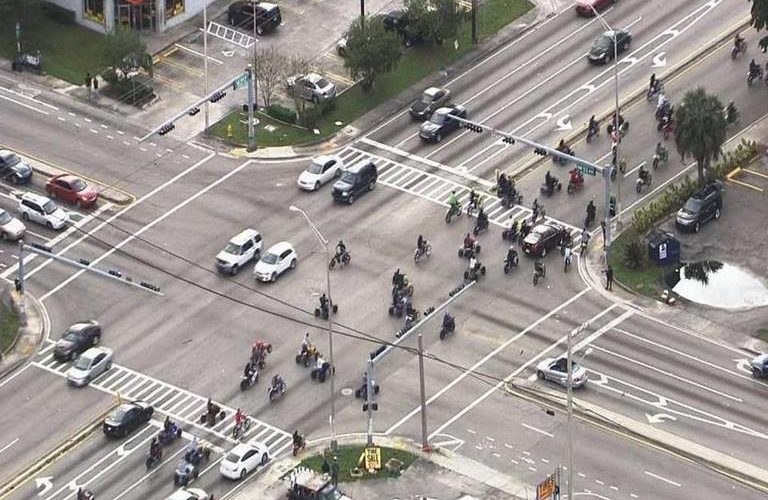What began as a way to honor the life of slain biker in Philadelphia has morphed into an cultural phenomenon which attracts people from across the globe. Thousands of riders sporting their favorite ATVs, dirt bikes, scooters and everything in between flock to the streets and highways.
The bikers see the weekend as an escape, a celebration of life almost. Many come from rough neighborhoods where life is not promised. For at least a few days, they will set aside their differences and unite over something they love: riding.
Law enforcement, however, have a starkly different opinion.
As the number of bikers descending to South Florida has grown, so has the police presence. News outlets broadcast the same few soundbites in the days leading up to Martin Luther King Jr. weekend.
“It is illegal to operate a motorcycle, minibike or all-terrain vehicles on I-95 or any parts of the expressway,” a Florida Highway Patrol Trooper said at a Miami-Dade Police Department press conference.
“Local lawn enforcement will have a zero-tolerance approach toward illegal driving activities,” read a FHP news release.
“Our law enforcement partners want to assure you there is a unified effort throughout the county to ensure the day remains safe for all,” said a Facebook post from the Broward Sheriff’s Office.
To law enforcement, the bikers have co-opted King’s message of peace.
Officers and news anchors use buzz words like “terrorize,” “careless,” and “suspicious” to paint the bikers as hoodlums without respect for authority. And while some of their actions — driving against traffic, on busy highways, etc… — are clearly unsafe and illegal, it’s also true that their movement points to something bigger.
A little more than a year ago, filmmaker Kareen Walls Sr. had the idea to capture the true essence of the weekend for a documentary that came to be known as “Miami MLK 2019 The Movie.” In it, he touched on many aspects of bike culture and addressed some of the misconceptions like the idea that they need to go to motorcross tracks.
“There hasn’t been an escape for us to go do this everyday,” Walls narrated. “… Everybody don’t like jumping hills. A lot of us just like the thrill of wheelieing [sic]. If we can find a place where we can just do this on the regular, I guarantee at least 90-percent of us won’t be out here on the streets like that.”
As a fellow biker, he did have some inherent bias yet it didn’t affect his ability to criticize both his peers and law enforcement.
By far the documentary’s most illuminating part was during the filmmaker’s impromptu conversation with what appeared to be a Broward Sheriff’s Office deputy. In response to Walls’ attempts to explain the importance of MLK weekend, the deputy brings up the snowball effect.
“Where do we draw the line with it’s okay for a hundred four-wheelers to take over the road” the deputy said. “And then it becomes what then? Another group wants to do this and another group wants to do that.”
The deputy went on to suggest that the bikers seek parade permits to make it more official. All of these were valid points that seemed to resonate with Walls despite having seen officers behave very aggressively with his peers.
“We have to get better structure as a unit,” Walls concluded. “We have to have rankings, leadership and people got to follow by those rules because if not, the law is going to come in.”
That, not the individual riders or the event itself, is the issue at hand. While Walls’ sentiments puts the onus on the bikers, it also highlights how the police handle minorities and the mistrust that manifests.
Make Sure You are Subscribed to our Facebook page!
Source: Miami Herald
